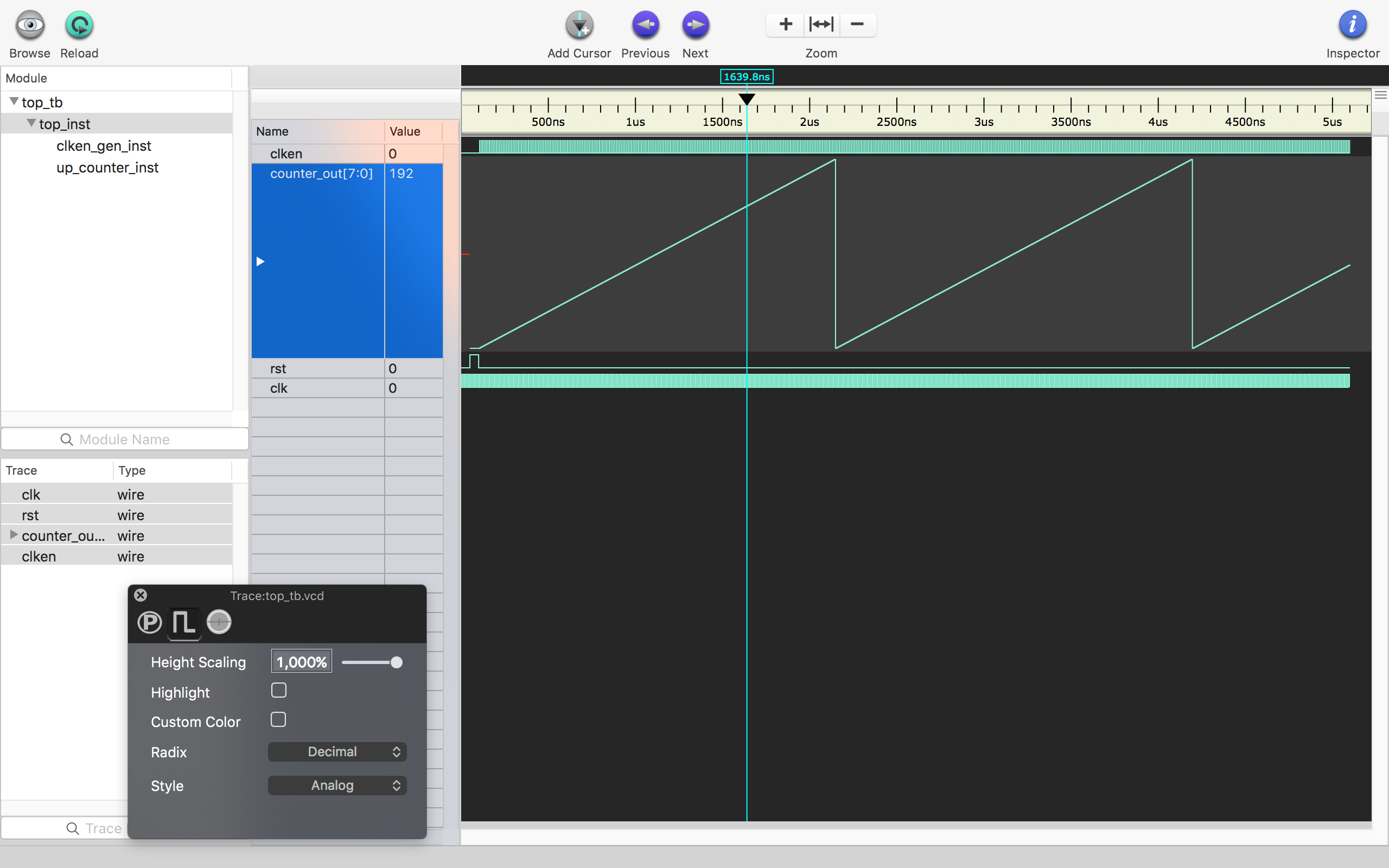One can say VHDL is second class citizen in open source software / hardware world. For example, IceStorm project only supports Verilog. Furthermore, easy to use and FOSS simulators like Icarus Verilog and Verilator also (in stable sense) only support Verilog.
Here you can find a bare-bones, OSX based Verilog simulation toolchain that I created using several different tools. Everything should be working under Linux as well (except Scansion) though I haven't tested yet.
There are four different Verilog source files:
up_counter.v: 8bit unsigned up counter with clock, reset and enable inputs.clken_gen.v: Clock enable pulse generator module with clock and reset inputs. Division ratio is parameterised.top.v: Main top module that instantiates anup_counterand aclken_genmodule.top_tb.v: Testbench module that instantiates the top module and feeds the necessary test signals to the module.
If you want to change the example structure, see the Makefile then:
- Change
SRCSvariable with new source file names ... - Change
TESTBENCHvariable for another test bench file name ...
Also, if you want to change the resulting waveform file:
- Modify
$dumpfile("top_tb.vcd");line in the testbench code.
-
Hit
make simulateto simulate the codebase and run the testbench using Icarus Verilog.- Testbench's output stream (
$display,$monitorfunctions' outputs and also any error/log messages) is directed to$TESTBENCHNAME_log.txtfile to make later analysis more convenient.
- Testbench's output stream (
-
Hit
make lintto trigger linting using Verilator. -
Hit
make scansionto open up the Scansion application with recently created signal file. Only works under OSX. -
Hit
make gtkwaveto open up the GTKWave application with recently created signal file. Not suggested for OSX. -
Hit
make cleanto delete any generated files.
You can use Homebrew (brew) to install prerequisites. To install Homebrew run:
/usr/bin/ruby -e "$(curl -fsSL https://raw.githubusercontent.com/Homebrew/install/master/install)"- Run
brew install icarus-verilogto install on OSX system.
- Even though verilator itself also supports simulation, I'm only using it to 'lint' the codebase for any syntax / logical errors.
- Run
brew install verilatorto install on OSX system.
- This application can be used to investigate .vcd waveform files. It was not very stable under OSX, so I moved on to other tool. Under Linux, this probably runs better.
- Run
brew install homebrew/gui/gtkwaveto install on OSX system.
- This application is used to investigate .vcd waveform files. It is OSX only. It works much better (more stable) than gtkwave under OSX.
- Visit http://www.logicpoet.com/scansion/ webpage to download the application. Makefile assumes that you put the OSX executable under
/Applications/folder. You can change it if you want.
- Sublime Text doesn't support Verilog language as valid syntax extension. You should install https://packagecontrol.io/packages/Verilog package from package manager to have basic syntax coloring and couple of extra features for Verilog inside Sublime Text.
- You can, of course, use any other text editor as well. :)
Scansion and GTKWave support visualising ports as analog waveforms. This feature is very useful in signal processing applications. Below you can see an example screenshot from Scansion:
Hit ⌘ + 2 to open Trace Inspector menu and select the desired signal. First, change the Style to Analog then adjust Height Scaling parameter to some high value to have bigger headroom in the display.
You should check these short but dense documents about Verilog:
